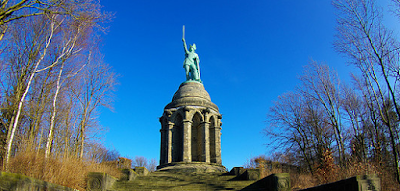
One of the fifteen decisive battles of history identified by Edward Creasy was the battle in the Teutoburg Forest where the Roman General Varus lost three legions almost to a man to a huge ambush by the German tribesmen. We have a pretty good account of the engagement from Tacitus and Creasy writes it up superbly to make it into a great piece of writing. It is hard to dispute that this is indeed a decisive battle since it prevented the Romans from establishing a frontier much further east which would have made the empire much deeper and would have reduced the length of the frontier that needed to be defended considerably. Had they succeeded the empire might well have lasted a lot longer.
But having told us about it in splendid style, he then picks up on an aspect of it that would completely elude a modern historian. The German commander was a man called Arminius. He had been held as a hostage as a young man and had served in the Roman army and so knew their culture and their tactics well. This no doubt played a large part in how he succeeded in winning a stunning victory against an enemy he must have had the measure of. It also makes him not exactly a pure example of a German barbarian leader.
Nonetheless Creasy presents him as a sort of proto-German nationalist figure. Arminius had a brother who had stuck with the Romans. There is a story that not long after the battle in the forest subsequent campaigning brought the two men came close to one another. Contact was made and the archers on both sides withdrawn to allow them to talk to each other across a river. This has been portrayed by much later German writers as a dramatic encounter with the patriotic true hearted Arminius blasting his backsliding sibling for cowardice by continuing to work for their people’s enemies.
That the Nineteenth Century Germans might look back to Arminius for a hero is perhaps understandable. They were forging a new country which had never had a political unity in its history and you can see why a man who defeated an invasion of what was to become Germany might fit the bill. The fact that the very concept of Germany would not have occurred to him and even his own family members were behaving completely at odds with the notions of 19 centuries later are the sort of details that nationalist myths generally ignore.
But Creasy comes up with a completely unexpected twist. Arminius is in fact English.
How does he work that one out?
Well Arminius was a member of the Cherusci tribe, who were closely related to the Angles and the Saxons. These were the people who had invaded Britain with the fall of the Roman Empire. So Arminius could be held to be an ancestor of the modern day inhabitants of England. This might allow for him to be a shared hero between the two countries. But the connection with the English was much stronger than the one with the Germans. How so? Well Arminius had become a folk hero amongst the German tribes following his amazing victory against the world’s superpower. Arminius is the Roman version of his name, in it’s native form it was Irman or Herman. Herman became deified and was worshipped. One site of the cult of Herman was the Irman-Sul deep in Saxon territory near Minden. Defending this sacred place was later to become a bone of contention between the Frankish king Charlemagne and the pagan Saxons. The campaign was so ferocious that Creasy suggests that the Saxons were very nearly exterminated.
This left the English as the main owners of the heritage of Herman. It must have made sense in 1850. With rapid industrialisation removing people ever further from their roots lots of people in lots of countries were on the look out for their tribal ancestors. And if you are going to have a tribal ancestor, Herman was an impressive one to have. Later developments in European history made the idea of pinching German national heroes and rebranding them as English much less appealing. But it is an intriguing footnote and shows that our view of the past is both a lot more plastic and a lot more influenced by the times we are living in than we often realise.
